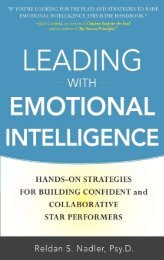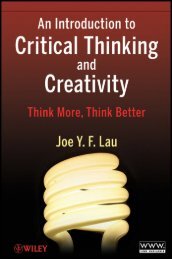A Selective Study in Post-Colonial Bengali Cinema - always yours
A Selective Study in Post-Colonial Bengali Cinema - always yours
A Selective Study in Post-Colonial Bengali Cinema - always yours
Create successful ePaper yourself
Turn your PDF publications into a flip-book with our unique Google optimized e-Paper software.
11|Journal of <strong>Bengali</strong> Studies, Vol. 1, No. 2<br />
Chapter four of Nabarun Bhattacharya's Herbert conta<strong>in</strong>s the episode of B<strong>in</strong>u (the naxalite<br />
nephew of Herbert), and it beg<strong>in</strong>s with a quotation from Rangalal Bandyopadhyay, “Oi shuno! Oi<br />
shuno! Bheriro aaoyaj he Bheriro aaoyaj!” (Hark! Hark! The sound of the Drums of War, dear, the<br />
sound of the Drums of War!). This l<strong>in</strong>e is actually taken from Rangalal Bandyopadhyay's poem<br />
“Shadh<strong>in</strong>ota H<strong>in</strong>otay Ke Banchite Chay” (Who Wants to Live Without Freedom!), that became one<br />
of the greatest patriotic-revolutionary songs of n<strong>in</strong>eteenth century, and as a great poetry of<br />
nationalism, was second only to Vande Mataram <strong>in</strong> terms of its impact on the people, though now<br />
very few <strong>Bengali</strong>s would be able to remember the entire poem beyond the title. Now, the parallels<br />
are too obvious to miss. The trajectory of Naxalite movement shares some uncanny similarities with<br />
that of our armed freedom struggle. Herbert takes place <strong>in</strong> a space time location that still has<br />
memories (perhaps deeply buried with<strong>in</strong> the unconscious, like the memory of B<strong>in</strong>u's diary was<br />
buried with<strong>in</strong> Herbert's unconscious and it returned to haunt Herbert <strong>in</strong> his dream) of Bengal<br />
renaissance and the revolutionary nationalist movement. The Central Kolkata residence of Herbert –<br />
Sahebpara (erstwhile white town) is 20 m<strong>in</strong>utes walk from his residence, we are told <strong>in</strong> the novel<br />
(47) – has been the birthplace of the social, political and cultural awaken<strong>in</strong>g of Bengal, someth<strong>in</strong>g<br />
that has been made obscure to the generations liv<strong>in</strong>g <strong>in</strong> post-Independence Kolkata. The novel<br />
draws our attention to that obscurity while quotations from n<strong>in</strong>eteenth century poetry are placed<br />
parallel to the actions that are tak<strong>in</strong>g place <strong>in</strong> contemporary Kolkata. Each quotation, acts like “a<br />
giant metaphor, or analogy” to a correspond<strong>in</strong>g event <strong>in</strong> the novel <strong>in</strong> a strategy of montage, we can<br />
say follow<strong>in</strong>g Keith Cohen (87). And <strong>in</strong> this analogy there is a heightened contrast between the<br />
coded past glory, and the contemporary pett<strong>in</strong>ess: Herbert is to Bengal renaissance what the times<br />
of the house gecko is to the age of the great reptiles.<br />
Unfortunately these quotations f<strong>in</strong>d no echo <strong>in</strong> the film. The film-maker probably could not<br />
f<strong>in</strong>d a way to represent these elements <strong>in</strong> an audio-visual medium; they are completely discarded <strong>in</strong><br />
the movie. Thus Herbert Sarkar is even more historically impoverished <strong>in</strong> the film than he was <strong>in</strong>

















